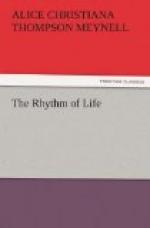But now I spoke of words encountering as gay strangers, various in origin, divided in race, within a master’s phrase. The most beautiful and the most sudden of such meetings are of course in Shakespeare. ‘Superfluous kings,’ ‘A lass unparalleled,’ ‘Multitudinous seas:’ we needed not to wait for the eighteenth century or for the nineteenth to learn the splendour of such encounters, of such differences, of such nuptial unlikeness and union. But it is well that we should learn them afresh. And it is well, too, that we should not resist the rhythmic reaction bearing us now somewhat to the side of the Latin. Such a reaction is in some sort an ethical need for our day. We want to quell the exaggerated decision of monosyllables. We want the poise and the pause that imply vitality at times better than headstrong movement expresses it. And not the phrase only but the form of verse might render us timely service. The controlling couplet might stay with a touch a modern grief, as it ranged in order the sorrows of Canning for his son. But it should not be attempted without a distinct intention of submission on the part of the writer. The couplet transgressed against, trespassed upon, shaken off, is like a law outstripped, defied—to the dignity neither of the rebel nor of the rule. To Letters do we look now for the guidance and direction which the very closeness of the emotion taking us by the heart makes necessary. Shall not the Thing more and more, as we compose ourselves to literature, assume the honour, the hesitation, the leisure, the reconciliation of the Word?
DR. OLIVER WENDELL HOLMES
It is good to go, now and again—let the American phrase be permitted—’back of’ some of our contemporaries. We never desired them as coevals. We never wished to share an age with them; we share nothing else with them. And we deliver ourselves from them by passing, in literature, into the company of an author who wrote before their time, and yet is familiarly modern. To read Dr. Oliver Wendell Holmes, then, is to go behind the New Humorist—into a time before he was, or his Humour. Obviously we go in like manner behind many another, but the funny writer of the magazines is suggested because in reference to him our act has a special significance. We connect him with Dr. Holmes by a reluctant ancestry, by an




